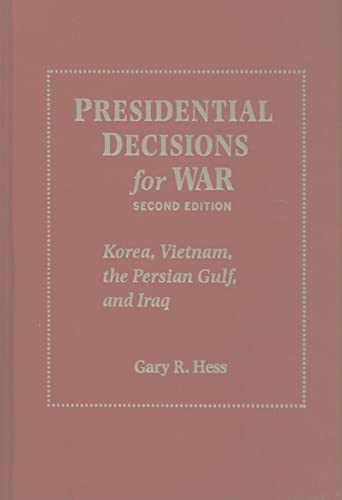
Presidential Decisions for War
by Gary R. Hess
"Korea, Vietnam, the Persian Gulf, and Iraq"
Popularity
2.45 / 5
* A book's popularity is determined by how it compares to all other books on this website.
Where to buy?
Buy from Amazon* If you buy this book through the link above, we may receive a small commission at no extra cost to you.
Presidential Decisions for War by Gary R. Hess
Details
Perspective:
Commanders
True Story:
Yes
Biography:
No
Region:
Asia
Page Count:
352
Published Date:
2009
ISBN13:
9780801891236
Description
Brief Summary
Presidential Decisions for War by Gary R. Hess is a thought-provoking exploration of pivotal moments in recent American history when U.S. presidents made critical decisions to engage in war. Hess delves into the complex factors influencing these decisions, examining both domestic and international pressures. The book provides a detailed account of presidential decision-making from the Vietnam War to the Iraq War, offering readers a nuanced understanding of how leaders navigate the challenges of war, diplomacy, and policy.
Main Themes and Topics
One of the central themes of the book is the concept of presidential authority and decision-making in times of conflict. Hess explores how different presidents have wielded their power to shape military engagements and their outcomes. The author also examines the interplay between political, military, and ethical considerations that influence these decisions. Additionally, Hess tackles the topic of war in the context of international relations, discussing how U.S. presidents have attempted to restructure global dynamics through military intervention, as highlighted by the Bush administration's approach to preemptive war and democracy building.
Writing Style and Tone
Gary R. Hess employs a scholarly yet accessible writing style, making complex historical and political analyses understandable to a broad audience. His tone is balanced, presenting multiple perspectives on controversial topics. The narrative is well-researched and meticulously documented, providing readers with a comprehensive view of the intricate processes behind presidential war decisions. Despite the academic nature of the book, Hess's clear and engaging prose helps maintain the reader's interest throughout.
Criticism
While the book is widely acclaimed for its thorough research and insightful analysis, some critics have noted that it could benefit from a more critical examination of the long-term consequences of decisions covered. Additionally, a more in-depth exploration of lesser-known conflicts might provide a more rounded picture of presidential decision-making across different scenarios. However, these criticisms are minor compared to the overall strength of Hess's work.









